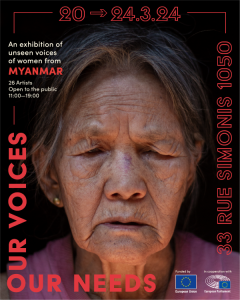AICS Hanoi, engaged in the humanitarian assistance in Myanmar, is glad to share the following press release issued by the European Union.
Bruxelles, March 11, 2024 – “The European Union and the international community must remain by Myanmar’s side and increase humanitarian and development assistance”, Vice-President of the European Parliament Heidi Hautala said today ahead of an art exhibition in Brussels. The exhibition, open to the public from 20 to 24 March 2024, sheds light on the struggles of Myanmar people, and especially women, amid the country’s deteriorating security environment.
The exhibition – ‘Our Voices, Our Needs’ – enables people from inside Myanmar coming from different ethnicities, religions, regions and backgrounds to represent their daily lives, visions and dreams through various forms of art. It is an open space for self-expression. It provides visitors to the exhibition with an opportunity for both contemplation and action. The exhibition is supported by the European Union and the European Parliament.

“Our Voices, Our Needs” Struggles and challenges that women are facing amid deteriorating security situation in Myanmar showcased at Brussels art exhibition
In February 2021, a military coup halted Myanmar democratic transition, with devastating effects for the country and its people. As of today, over 7,200 civilians have been killed and more than 20,000 detained, with 119 on death row. The country is plunging daily into deeper humanitarian and socio-economic crisis, with 2.6 million people internally displaced, almost half of the population living under the poverty line, and 18.6 million people in need of humanitarian support (up from 1 million before the coup). It is estimated that more than 9.7 million of these are women and girls. Their vulnerability to trafficking, gender- based violence and other violations have spiraled in the last 3 years. Despite the broadening humanitarian disaster, the UN estimates that in 2023 only 29% of the humanitarian needs were met.
Ms Hautala, a renowned human rights defender and former Minister for International Development of Finland who has worked for decades to give voice to dispossessed and oppressed peoples around the world, said “It would be easy for the EU and the international community to listen to some voices that are demanding we should abandon our presence and work in Myanmar. But in fact it’s more important than ever that we are on the ground, listening to people and supporting them in their most basic needs”.
“As in any conflict situation, women are often those who bear the heaviest burden. We haven’t seen poverty levels like this in Myanmar for more than 15 years. Development gains that took decades have unraveled rapidly”, a humanitarian expert added. “People’s livelihoods are endangered more than ever, and the uncertainty that characterizes daily life is affecting all aspects of an already fragile economy hard-hit by inflation and shortages”, she added.
Women have played a pivotal role in standing up to the regime, and have also been quick to step in to provide support systems to their families and communities. They serve as multipliers of essential goods and social services. Myanmar is a society in which women’s voices are often overshadowed and marginalised. Since the military coup, gross human rights violations in Myanmar have multiplied. The voices of the Myanmar people are growingly silenced by the military junta and restrictions on freedoms of expression, media, association, travel, access to information and to the internet are muting the voices of those in more vulnerable positions. As one of the artists whose works are showcased in the exhibition signaled, “showing our work in Brussels is a way to remind the international community about the largely forgotten crisis afflicting our country and its people.”
The Head of the EU Delegation to Myanmar, Ambassador Ranieri Sabatucci, said: “The EU has committed more than €290 million over the past three years to address the multifaceted crisis in Myanmar. This has been a vital lifeline for the people. We have also been supporting and advocating for maintaining the hundreds of thousands decent jobs created for women mostly before the coup, in spite of the economic crisis and restrictions imposed. All EU development and humanitarian funding is channeled via international and local partner organisations. The European Union is as determined as ever to play its part in supporting the needs and aspirations of the people of Myanmar. But there’s a funding gap for humanitarian actions of well over half a billion dollars that necessitates other countries and partners to step in with their support. That’s why visibility actions like this exhibition are so important.”
‘Our Voices, Our Needs’ – An art exhibition of the unseen voices of women in Myanmar Open to the public and can be visited from 20 to 24 March 2024 at 33 Rue Simonis, 1050 Brussels, from 11:00 to 19:00 hrs daily. The exhibition is supported by the European Union and the European Parliament.
